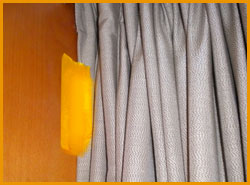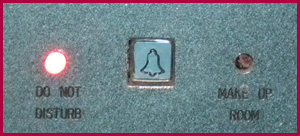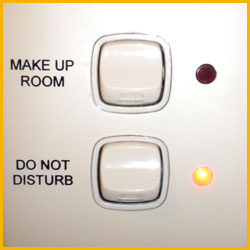
![]()
You’ve heard of ‘truth in advertising’. How about ‘truth when pulling my leg’? The Rendezvous Hotel Auckland tells one porkie after another. First, upon ignoring my letters of complaint, and after having to chase them up several times, they said, ‘…apologies for the delay in getting back to you but we do take such incidents very seriously hence an internal investigation has taken place with the following finding, from which we ask you read as an explanation and not an excuse for the lack of service you received.’
It is important for readers to note that the word ‘service’ is misleading when used in business. Anyone reading this would be mistaken if they assumed that a customer wants free attention or any love and affection or any cow-towing. When a company does not provide service, or does not deliver a service, that company is admitting to stealing money. Service is not a nice-to-do to make people feel good. A lack of service is theft.
I was complaining about the hotel staff disturbing me, even after I had hit the roof and spoken with the duty manager who assured me that it would not happen again… only for it to happen again. I had asked not to be disturbed. I was disturbed. What did the hotel serve-up as an excuse? They said, ‘Our house keepers are under instruction that after a certain time they have to make contact with a room to ensure there has not been any accidents or incidents. However in your case with instruction on your sleeping pattern this was not relayed to our house keeping operations department, for which we do apologize.’
Let’s put aside the fact that the duty manager had assured me that she had spoken with the culprits and their supervisor. For now, let us deal with this heart-warming gesture of concern by the hotel to make contact with a room after a certain time. What kind of time? For how long must a guest go underground before housekeeping must intervene? I’ve heard excuses and apologies in my time, but this one is the best by far. The only problem was, it does not make sense. So, after a long wait, and several calls and emails to follow-up with the hotel about ignoring my complaint, and after this comical excuse by the hotel (along with an offer of a $50 voucher which I refused), I responded thus:
In all my years of travel, I have never been told that hotel staff must make contact in the way you described.
1:00 pm and 2:00 pm are not excessive spans of inactivity. What triggered the concern on the part of the staff? One of those interruptions that woke me was on a Saturday around 1:30 pm. Are you seriously telling me that a guest who is not out of their room by 1.30 pm on a Saturday will be contacted for their own safety? If so, I will assist you to spread this policy all over the internet so that all travellers can start to behave themselves and accommodate your policies.
As for my request not being relayed to housekeeping, I find that casts a shadow of unfair incompetence on the duty manager with whom I spoke and who seemed concerned that such a thing should happen in the first instance. She had assured me most emphatically that she would follow the matter up personally by contacting the head of housekeeping. She called me back forty minutes later and confirmed that she had followed-up as she had promised. So how was it that even after the duty manager intervened, the same interruption took place? This points to more endemic issues than someone not being told.
I have been staying at your hotel for many years, long before the name changed to Rendezvous Auckland. On this occasion I stayed for seven days. Two months prior I was there for nine days. And such has been the pattern for over ten years.
If a hotel were concerned about a guest, they would be admired if the guest had missed a wake-up call or a known check-out time, or if the guest showed absolutely no activity whatsoever. I had borrowed two umbrellas on different days that were logged to my name and room… I had meals delivered at odd hours after 2:00 am… I had spoken with your staff about internet access twice. I had called down to book a taxi in my name and to my room. I had twice left large boxes at the front desk (with a range of calls to check on them). I had a courier delivery that was delivered to my room comprising one large 28 kg box. I had another courier delivery three days later comprising four heavy boxes that were delivered to my room. I had placed a large framed glass certificate at the front desk for a third-party to collect and I enquired about this on three occasions. I was on pleasant terms with your doorman and concierge. I had twice gone down to ask your receptionist for a copy of a letter, and once over the phone. Other activity was evident such as when I had phoned your hotel operator to ask about two personnel, and to ask for a phone number.
 My room access card gives you computer monitoring, I presume. And your team could have seen from my card the times I swipe. You can see a lot of activity, including many visits to the gym and phone logs… All this activity is not the pattern of a guest that had gone underground or become a recluse or a hermit. This was a guest who made it perfectly clear that he was in the hotel. A simple query would have allayed any fear of a potentially dormant guest who might have been in pain or agony behind closed doors. A guest who upon check-in asked for a quiet location. A guest who so needed to sleep that he placed yellow packing tape against the curtains to block out the light, and such tape would have been evident and obvious to the housekeeping staff.
My room access card gives you computer monitoring, I presume. And your team could have seen from my card the times I swipe. You can see a lot of activity, including many visits to the gym and phone logs… All this activity is not the pattern of a guest that had gone underground or become a recluse or a hermit. This was a guest who made it perfectly clear that he was in the hotel. A simple query would have allayed any fear of a potentially dormant guest who might have been in pain or agony behind closed doors. A guest who upon check-in asked for a quiet location. A guest who so needed to sleep that he placed yellow packing tape against the curtains to block out the light, and such tape would have been evident and obvious to the housekeeping staff.
The new hotel manager wrote to apologise and asked me what I wanted. I said that I do not want anything. I offer him my assistance and wished him well.
This was the original letter that was ignored:
…There is absolutely no reason at all that I would need to stay at your hotel, if it were not for the need to sleep.
 On one of the days, one of your housekeeping staff phoned me to ask if she could clean my room. She knew that I had the DND light on because she had placed a card under my door. I have never understood why housekeeping thinks that phoning is not a form of disturbing. When she rang, I was asleep. I keep odd hours. I work late nights…
On one of the days, one of your housekeeping staff phoned me to ask if she could clean my room. She knew that I had the DND light on because she had placed a card under my door. I have never understood why housekeeping thinks that phoning is not a form of disturbing. When she rang, I was asleep. I keep odd hours. I work late nights…
So I explained to the lady that it is pointless to wake me up to ask me if the DND light was real or not. I called downstairs and complained. I was told that they will have a word with her. Why should staff be trained at my expense? How would anyone from your management team like me to phone them at 1:00 am to ask them a silly question. My 1:00 pm is like their 1:00 am.
 Then two days later, the doorbell rang. I got out of bed, and the woman asked me if I wanted my room serviced. I did not utter a word, because it would have been unpleasant. She kept talking, explaining that she had placed a card (which she bent down to retrieve) and kept trying to find the words to communicate with a guest who refused to utter a single word. She saw that I was just out of bed, disheveled, and half asleep. While she spoke, I kept pressing the DND button, flashing the light in protest. She apologised and walked away.
Then two days later, the doorbell rang. I got out of bed, and the woman asked me if I wanted my room serviced. I did not utter a word, because it would have been unpleasant. She kept talking, explaining that she had placed a card (which she bent down to retrieve) and kept trying to find the words to communicate with a guest who refused to utter a single word. She saw that I was just out of bed, disheveled, and half asleep. While she spoke, I kept pressing the DND button, flashing the light in protest. She apologised and walked away.
I called down and spoke with a Tracy I think. She said she would have a word with the woman.
I do not care what your policy is or what it should be or who did or did-not do the right thing. I pay for a service, which is four walls. We have an international agreement that says ‘Do not disturb’. Nothing more should be said.
Why take my money and not deliver on the absolute basic thing?
Other ‘do not disturb’ incidents are mentioned in this article.
WHAT CAN WE LEARN FROM THIS?
Hotels and retailers understand ‘the power of the brand’, but they do not embrace ‘the way of the brand’. Imagine the production line at Cartier or Tiffany or Prada. Imagine the manufacturing processes at Porsche or Bently. Imagine the assembly belts at BMW or Bang & Olufsen. Do you think that any worker from any shift can alter the specifications? No way! Strict, almost religious processes must be followed. More importantly than the processes is the ethos. The way of life. They fixation. The art. The insistence and intolerance to anything that deviates from the brand. So you see, each brand must be nurtured within a religious, jealous, zealous environment that will not tolerate anything that jeopardises the brand promise; not because we love customers so much, but because we love our art and our craft and our integrity and what we stand for, and why we exist.
When it comes to hotels and hospitals and retailers and service providers, they seem to presume that their brand is alive, so long as they have a logo to prove it. Nay. Having fancy websites with grand mission statements will achieve nothing. They must find a way to be consistent. They need to foster a religion that sweeps their staff along a track from which it would be shameful and sinful to deviate.
In this article, some people might assume that I was just complaining about two staff members breaking company policy. No, it is dozens of staff members destroying their brand, and taking my money without delivering on the core service. What triggered this article was not so much the bad service, but the bad ways in which they ignored my requests and emails over a long period of time. In my book, ‘How to Lose Friends and Infuriate People’, I said, ‘The single most important element in customer service is speed’. In a chapter about customer service, I added:
There is an element to customer service that focuses on complaints resulting from faulty or incompatible goods and/or broken promises. Chief executive officers must carefully study why certain issues arise. If organisations do not manufacture robust products, or if they send out service technicians who perform half-hearted tasks, the organisations deserve to be out of business. Chief executive officers whose production lines still pump out substandard products do not deserve one moment’s rest. Senior executives cannot ethically command a salary so long as they cheat the customer by taking good money only to deliver rubbish, frustrations, and broken promises in return. Furthermore, profits are lost every time an error is made or a faulty product is replaced.
Therefore, such floundering is a disservice to shareholders — and what could be more irresponsible than that? Many organisations fail to realise that once customers have paid for their goods or services, they have exchanged money for whatever was given in return. Money is predictable. It works every time. It does not need service calls, nor is it ever faulty. The exchange is a very safe bet (notwithstanding fraud). Whether it be exchanged for bananas or a new computer, fault-free money is given in good faith. Imagine if money were as susceptible to faults as the product for which it was exchanged, thereby ‘inheriting’ the qualities of the product. This would mean that every time the operating system on your computer froze, the money you paid for it would freeze in the bank or wherever it is at the time. What if every time your toaster failed to work, or you bought apples that tasted like chalk, the money that you used to buy these items also failed or perished? What if there were some metaphysical link associated with each transaction? What would become of certain rich people who have amassed their wealth through lies and deceit? How successful would some organisations be today if they were accountable through a ‘law of inheritance’? This would be a scary notion indeed. As the networked world develops, more of this kind of accountability will befall organisations that can least afford it. Financial ‘ancestry’ would prohibit corporations from building their empires on money taken from customers who were given shoddy products. There is also the issue of ‘unfair exchange’. Any organisation that seeks to make a profit from its goods or services ought to come to terms with the fact that it is not doing the customer any favours. When a customer exchanges money for a new chair, the customer is the one doing the company a favour. In exchange for one chair, the customer is paying the retailer for the chair’s original cost, plus a little extra to help pay for expenses and overheads, plus more free money for the retailer’s personal bank account.


Comments are closed.